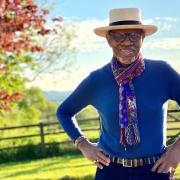Tom Scott might be the CEO of Worcestershire County Cricket Club, but at heart, he’s still the 10-year-old boy riding his bike down to New Road and sneaking in to knock a ball around the outfield at tea. Tanya Gledhill met the former police detective and Cotswolds businessman on the hallowed turf

Tom Scott’s a very happy man. And why wouldn’t he be?
From his office high above the hallowed turf of New Road, with Worcester’s majestic Cathedral hugging the boundary and verdant flood meadows of the Severn beyond, he’s realised his boyhood dream - the top job at Worcestershire County Cricket Club.
The Telegraph calls the county ground one of the 14 most beautiful cricket venues in the world.
But anyone who knows it, Tom included, will tell you that those it’s up against - Lord’s, the Adelaide Oval in Oz, Basin Reserve in Wellington, and Beausejour in St Lucia in the Windies among them - don’t hold a candle to the ethereal beauty of this corner of our green and pleasant land.
Even for non-cricket fans, the appeal of drinking tea and eating cake in the shadow of the imposing Norman tower, with the King’s School playing fields behind the wicket and the river wending its way around the outfield, is almost irresistible.
Though as idyllic as the set-up here is, Tom’s path didn’t always point to it.
Brought up in Ronkswood on the other side of town - one of the city’s less salubrious housing estates, now fairly socially deprived and rife with drug use - he was sent to the then Nunnery Wood Secondary School.
Now a 1,300-pupil comprehensive, it’s not exactly dripping with notable alumni - Peterborough and Bristol City footballer Mark Little, and political economist Peter Middlebrook, UN staff member and formerly at the World Bank are about the only two.
The point is, it doesn’t seem an obvious breeding ground for a champion of cricket, the most ‘establishment’ of games.

Leather upon willow and all that.
But Worcester, Worcestershire, is different. New Road is a ground for everyone.
And from the moment 10-year-old Tom leant his bike up against the gates, sneaked in with his bat and knocked a ball around on the outfield at tea, the flame burned bright.
“I’ve been a Worcestershire fan ever since I can remember,” he says.“I rode my bike down to the ground when I was about 10 years old, because there was no other way of getting there.
“It’s every fan’s dream, every boy’s dream to one day become the Chief Executive of their favourite club, so when the chance came, I couldn’t resist.”
From those heady push-biking days, with grazed knees and Worcestershire legends Glenn Turner, Vanburn Holder and Basil D’Oliveira on the field, there followed an illustrious career in business.
In 1990, former police detective Tom founded the Cotswold Group in Gloucester.
Rapidly, it became the UK and Europe’s go-to investigation and surveillance company, delivering results through its specialist investigation and intelligence services.
Working for some of the biggest insurance companies, conglomerates and local authorities, it still has almost 300 on the payroll.

Prospect, its intelligence database designed to uncover fraud in the motor, property, liability and travel sectors, quickly became a market leader.
And still it is, working with eight out of 10 of the biggest insurers.
For three years, it was the headline sponsor at New Road, an honour now taken by Malvern-based Blackfinch Investments.
Tom, now 58, bowed out of Cotswold Group in 2011 when the company was acquired by G4S, the security company then headquartered on the Farncombe Estate near Broadway.
But it wasn’t until early 2016 when Worcestershire approached him - the ground still echoing with the names of legendary players like Graeme Hick, Ian Botham, Tom Moody and Glen McGrath.
Working with director of cricket Steve Rhodes and club chairman Stephen Taylor, he replaced in an interim capacity CEO David Leatherdale when he left to take up a post with the Professional Cricketers’ Association.
Six months later, Tom - who had been a member of the club’s informal strategic group - was given a permanent contract, and he couldn’t have been more delighted.
“When the opportunity arose I couldn’t resist getting involved to see what professional sport was about,” he says.
“To do it at Worcestershire County Cricket Club is an honour and something I will always be grateful for.”

Though WCCC has turned a profit every year for the past six, easing financial constraints - as with most top-flight clubs - is still at the heart of its future strategy.
In the spring, he was quoted as saying he was determined to address the club’s £5 million debt - a serious millstone around its neck, despite the club’s recorded £400,000-plus year-end surplus.
Like Gloucester Rugby, the board’s strategy to ensure financial stability to drive on-field success rests little on the sport being played out in front of supporters week in, week out.
Worcestershire, like everyone else, has had to diversify in myriad ways, inventive ways, to become a 365-day-a-year business.
Because though the fast and furious Worcestershire Rapids T20 games, complete with dancers and hot tubs and blow-up pointy fingers and busy bars, draw sell-out crowds, the bread and butter, the four-day games, are a tougher fill.
To that end, the club has opened a coffee shop, Foley’s, to bring revenue directly into the club.
There are concerts - Olly Murs and Billy Ocean, among others this summer; cinema-under-the-stars events. There are weddings and conferences and funerals and dinners and school proms.
All shore up the club’s bottom line, and ensure investment into the playing department, which now under the captaincy of Joe Leach includes England all-rounder Moeen Ali and a promising academy section.
This in turn attracts the crowds on match days. It’s an essential loop.

“Our business strategy to create financial stability for the next 10 years,” says Tom.
“All first class counties have to generate income from commercial activity such as conferences, weddings and on-site facilities.
“One thing we have tried to instil is the need for all outlets within the ground to be operated by us rather than outsourced which generates 100% of the income for the club.”
Competition in Worcestershire is fierce. Sixways - home of Worcester Warriors rugby - is just across the city.
Worcester Arena, owned by the ever-expanding university, is just along the river.
Then there’s the rowing club, and myriad hotels and conference spaces all jostling for position.
Does this phase him? Even with £10 million expansion in 2012, which has seen a 120-bedroom Premier Inn built next to the ground and dazzling new conference facilities?
“Well we have to compete with other local venues,” he offers, carefully.
“This has led us to converting space at the club to offer a conferencing facility which is second to none within Worcester city centre.
“This lets local businesses hold off-site meetings and conferences for up to 300 delegates at a venue located next to a hotel with plenty of parking plus easy access to the city.
“If we continue to provide the right service we should be capitalise on this to benefit both the club and cricket going forward.”
This drive to generate commercial relationships with both new and current partners has led to three concerts planned this summer.
I can’t help wondering, with the current terror threat facing the UK, and more specifically the bombing in May at the Ariana Grande concert in Manchester, what the implications are for New Road.
Those of us who live here rejoice in Worcestershire being a rural backwater, at least when it comes to the national stage.
But if the events of the past few months have taught us anything, it’s that nowhere is immune.
Tom is determined that New Road will be recognised as a concert venue across the county, as well as the home of top-flight cricket.
“It’s something we’re trying to establish over the next three years as part of our wider business plan,” he says.
“It’s clear from what happened in both Manchester and London that security is of paramount importance, and to reassure those attending.
“We’ve been in contact with the police locally who have advised on the security arrangements.”
It’s just one of a number of issues he’s had to deal with since his arrival. “When I got here, I was tasked with looking at the structure of the club and its effectiveness,” he says.
“And to be honest, some changes were needed to bring the club up to date.
“Some very difficult decisions had to be made for the benefit of the club over the next five to 10 years.”
In terms of what, I ask. Personnel? Strategy? Finances?
He’s not in the mood to be drawn on the detail, but what he does say, tellingly, is that he sees his role as one to change the culture that has formed “over a number of years”.
“We have to start thinking commercially and making the most of the iconic location we own,” he says.
“ I feel confident that we now have the right team in place to create the right balance of a successful cricket club supported by an improved commercial offering.”
So what’s next for New Road, on the pitch and off it?
With an award-winning commercial team led by General Manager Jon Graham, another lifelong Worcestershire fan, the future surely points towards his ambition for the Division Two club, to be debt-free by 2020.
“Our squad of academy-produced players have matured into an exciting cricketing group capable of promotion and winning trophies,” he says, emphatically.
“Off the field the business has improved enormously with ventures such as Foley’s providing the public, members and supporters with facilities and the infrastructure you would expect from a first class cricket club.
“We remain ambitious to enhance the venue, and redevelopment of the New Road Stand is essential.
“But we must achieve financial stability before we go ahead with the development.
“The way I work is this. I have an open door policy - but I make sure I have the right people in the right positions so I can leave them to get on with the job.
“I anticipate us being in a much stronger position by the end of 2018 when we can seriously start to think about that process beginning.”



























